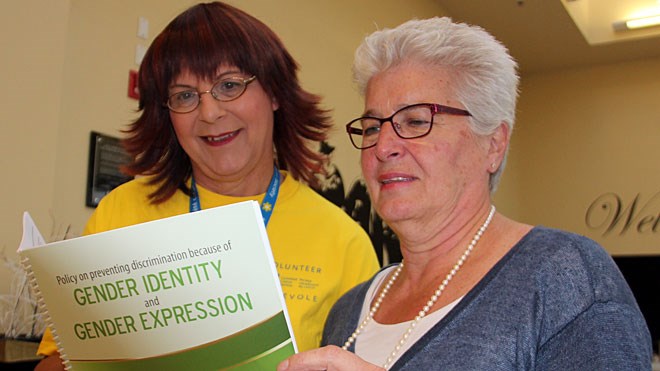While Helson's experience with her workplace was positive, she said she was happy to see the Ontario government pass “Toby's Law” two years ago.
The law amended the Ontario Human Rights Code to protect people from discrimination because of gender identity (the gender people identify with) and gender expression (how they express their gender).
“It's a long time coming,” Helson said.
While the law was changed in 2012, Ontario Human Rights Commissioner Barbara Hall has been hard at work since that time, writing a policy explicitly setting out what the amendments mean in practical terms.
She launched the commission's “Policy on preventing discrimination because of gender identity and gender expression” in Sudbury July 15, as part of the Sudbury Pride festival.
The event was attended by about 200 people, many representing local social service agencies.
The Ontario Human Rights Code now contains protections for transgendered people when it comes to issues such as employment, school, housing and services, she said.
“The name, the pronouns, that they use need to be respected by employers or landlords or service providers,” Hall said.
“It means they are entitled to use the change rooms, the washrooms that match their gender identity and gender expression.
“It means they're entitled to have identification changed — things like driver's licences — to match their lived identity.”
While the law has changed, the challenge is spreading the word about how organizations can provide services to transgendered people in an appropriate manner, Hall said.
She praised Greater Sudbury Police, which recently worked with the Sudbury-based transgendered support group TG Innerselves to produce a training video for service agencies about transgendered people's issues.
Transgendered people themselves are also beginning to demand that people respect their rights, Hall said.
TG Innerselves community relations officer Rita O'Link said the law change and the gender identity and expression policy means she can finally be recognized for who she truly is.
“On a practical level, this means everything,” she said.
“My family struggles with this. This sort of recognition lets them know that I'm safe out there with everyone else.
“This also lets them know that it's not something that's wrong with me, that it's something that we've had wrong in our social scripting.”
O'Link said the next struggle is getting the same protections passed at a federal level. “Right now, federally, I have no protections, while provincially I do,” she said. “If I step into a federal institution, I'm no longer protected.”
To access the Ontario Human Rights Commission's “Policy on preventing discrimination because of gender identity and gender expression,” visit www.ohrc.on.ca.
Join Sudbury.com+
- Messages
- Post a Listing
- Your Listings
- Your Profile
- Your Subscriptions
- Your Likes
- Your Business
- Support Local News
- Payment History
Sudbury.com+ members
Already a +member?
Not a +member?
Sign up for a Sudbury.com+ account for instant access to upcoming contests, local offers, auctions and so much more.
